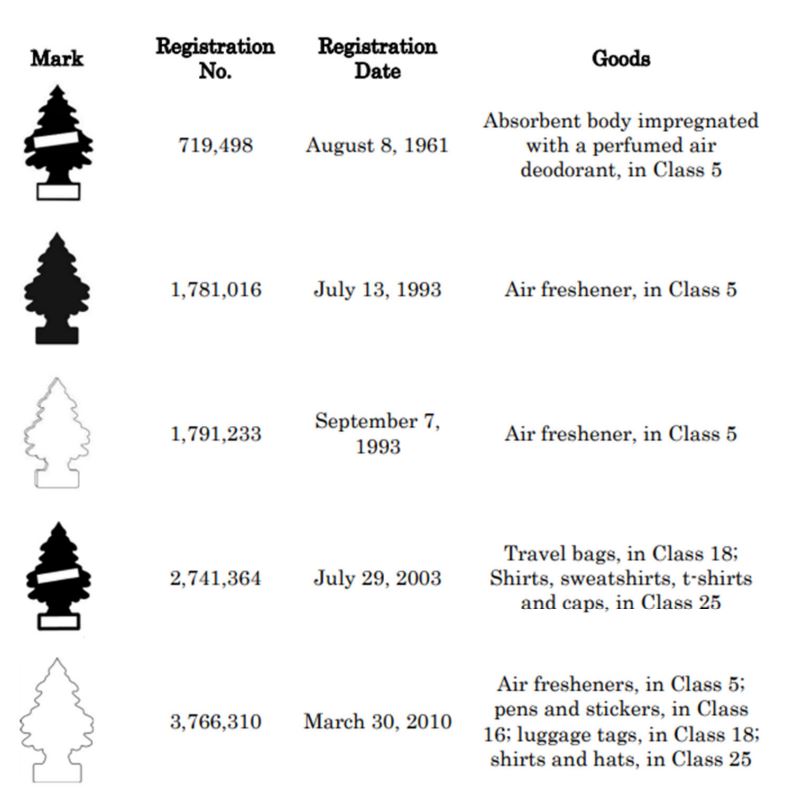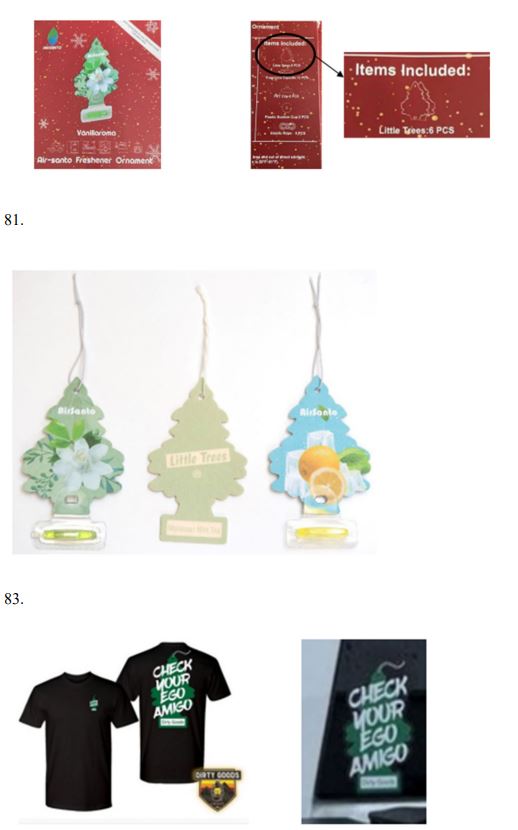Facebook Faces Contributory Trademark Liability for Marketplace Listings–Car-Freshner v. Meta
This case involves the hanging “car freshener” (which usually smells worse than any odors it tries to mask) in the shape of a tree. The rightsowner has trademark registrations for the tree-shaped outline:
Armed with protectable rights in tree outlines, Car-Freshner has turned into a serial plaintiff, though this is my first time blogging them in-depth.
Car-Freshner claims that Facebook online marketplace items are infringing, counterfeiting, and diluting. The opinion provides some examples:
I’d like to know more about the provenance of these items to assess their illegitimacy, but certainly the last one slows me down. I don’t understand the shirt’s message, but it clearly has a message unrelated to Car-Freshner’s trademark rights. I see potential legitimate trademark defenses for the design.
Trademark Claims
Car-Freshner submitted trademark takedown notices to Facebook and Instagram over four user-listed items. Allegedly, Facebook and Instagram refused the takedown demands because the trademark violations weren’t obvious. The court summarizes: “Meta claims that it raised issues with Plaintiffs, including “nominative fair use,” “commentary,” and “the un-likelihood of confusion based on the appearance of the marks in the actual marketplace, as they will be encountered by consumers.””
On the one hand, I dream of services standing up for their users and pushing back on overreaching takedown notices. On the other hand, I can’t believe Facebook or Instagram would actually do that. First, they have shown only light inclinations to stand up for users in the past–other than the Oversight Board, which has prompted Facebook to engage in greater reflection when human rights are in play. Second, and more importantly, because the trademark law consequences of getting it wrong are so severe that few services would choose to roll the dice.
This ruling highlights the legal risk. The contributory trademark infringement claim survives a motion to dismiss.
The court also survives the contributory counterfeiting claims because the tree mark is displayed in all of the allegedly violative items.
Contract Formation and Amendment
The news wasn’t just bad for Facebook on the trademark front. It also couldn’t enforce its TOS:
Plaintiffs do not admit that they were fully aware of the Terms. There is conflicting evidence about when CFC created its Facebook account, and there is no evidence of the Terms from 2010 and whether CFC had to assent to the Terms to register its account. There is also no evidence that CFC received an e-mail containing the updated Terms. Although Meta contends that it posted its term updates on users’ Facebook pages, there is no indication that those terms related to anything other than privacy concerns. As the record stands, this case resembles Specht more than Register.com….Meta’s argument that it notified users of updates in its Terms is also insufficient to bind CFC to the forum selection clause. Thus, the Court concludes that Plaintiffs did not assent to reasonably communicated terms and the Court will not enforce the forum-selection clauses.
Yowza. Any failure of Facebook’s TOS would have extraordinarily broad implications. I’m sure Facebook hopes this is a one-off or that it can be fixed on appeal.
Implications
This case covers some of the same ground as Tiffany v. eBay, but in a confusing way. For example, the court doesn’t detail exactly how Car-Freshner communicated its takedown demands, which was a central issue in the Tiffany case. Was the takedown demand specific enough to be legally effective?
For over a decade, the Tiffany case has stood for the proposition that failure to honor takedown demands could support contributory trademark infringement claims. The longstanding and well-understood legal standard makes it hard for me to believe that Facebook didn’t quickly yank the items after notice. Rulings like this reinforce that it’s too dangerous to stand up for users against takedown demands that may be illegitimate, which may not be the message we should send to online marketplaces–but it’s one they have surely internalized.
Case citation: Car-Freshner Corp. v. Meta Platforms, Inc., 2023 WL 7325109 (N.D. N.Y. Nov. 7, 2023)
UPDATE: In a January 2024 ruling, the court reiterated that all of the direct infringement claims were dismissed.


